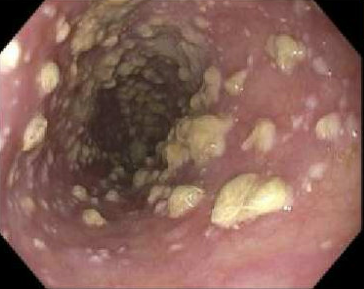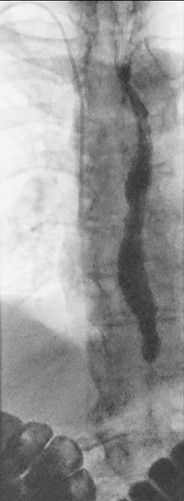Sunday Poster Session
Category: Esophagus
P0774 - Gut Dysmotility in Anti-Hu Paraneoplastic Syndrome With Small Bowel Adenocarcinoma and Nasopharyngeal Squamous Cell Carcinoma
Sunday, October 26, 2025
3:30 PM - 7:00 PM PDT
Location: Exhibit Hall

Eric Leung, MD
University of Texas Health San Antonio
San Antonio, TX
Presenting Author(s)
Jason N.. Chen, MD, Eric Leung, MD, Joshua Brabant, MD, Madhumitha Gautham, BS, John M.. Cunningham, MD
University of Texas Health San Antonio, San Antonio, TX
Introduction: Anti-Hu syndrome is a rare paraneoplastic syndrome most associated with small cell lung cancer (SCLC). Paraneoplastic syndromes associated with anti-Hu antibodies are diverse, including gastrointestinal (GI) symptoms of dysmotility and dysphagia. We present a novel case of Anti-Hu syndrome following resected metastatic small bowel adenocarcinoma with progressive neurologic decline, severe dysphagia, and concurrent nasopharyngeal squamous cell carcinoma (SCC).
Case Description/
Methods: A 66-year-old male with metastatic small bowel adenocarcinoma presented with two months of cognitive decline, hallucinations, dysphagia, and lower extremity weakness. Encephalopathy workup was unrevealing. MRI brain revealed white matter hyperintensities consistent with mild chronic microvascular disease and nasal masses diagnosed on biopsy as poorly differentiated nasopharyngeal SCC. Lumbar spine MRI showed enhancement of the cauda equina and conus medullaris suggesting an inflammatory process. Endoscopy revealed candida esophagitis without obstruction; however, dysphagia persisted despite eradication (Figure 1). Modified barium swallow study showed pharyngeal and esophageal dysmotility with minimal to no esophageal clearance and contrast retention (Figure 2). Paraneoplastic anti-Hu (ANNA-1) antibodies were positive in both cerebrospinal fluid and serum. He was treated with high-dose corticosteroids and intravenous immunoglobulin. Hallucinations resolved and mentation and lower extremity strength improved but dysphagia persisted requiring gastric tube placement.
Discussion: This case highlights anti-Hu paraneoplastic syndrome manifesting as immune-mediated encephalitis, motor neuronopathy, and dysphagia. While traditionally associated with SCLC, this patient’s small bowel adenocarcinoma and nasopharyngeal SCC raise questions about broader tumor associations. Anti-Hu is associated with cranial and sensory neuropathies, cerebellar ataxia, and limbic encephalitis. Cranial neuropathies involving the vagus nerve affect the enteric nervous system. GI symptoms are initial features in 12% of cases and develop in nearly 23% of patients. Gastroparesis is most common, but anti-Hu can affect any GI segment, causing pseudo-obstruction, ileus, or dysphagia. This is the first report of anti-Hu in a patient with small bowel adenocarcinoma and nasopharyngeal SCC. GI symptoms may precede diagnosis, thus, Gastroenterologists should maintain high suspicion for paraneoplastic syndromes in patients with unexplained dysmotility.

Figure: Figure 1. Endoscopy revealing candida esophagitis without any overt obstruction.

Figure: Figure 2. Modified barium swallow study showing minimal to no esophageal clearance and retention of contrast in the esophagus.
Disclosures:
Jason Chen indicated no relevant financial relationships.
Eric Leung indicated no relevant financial relationships.
Joshua Brabant indicated no relevant financial relationships.
Madhumitha Gautham indicated no relevant financial relationships.
John Cunningham indicated no relevant financial relationships.
Jason N.. Chen, MD, Eric Leung, MD, Joshua Brabant, MD, Madhumitha Gautham, BS, John M.. Cunningham, MD. P0774 - Gut Dysmotility in Anti-Hu Paraneoplastic Syndrome With Small Bowel Adenocarcinoma and Nasopharyngeal Squamous Cell Carcinoma, ACG 2025 Annual Scientific Meeting Abstracts. Phoenix, AZ: American College of Gastroenterology.
University of Texas Health San Antonio, San Antonio, TX
Introduction: Anti-Hu syndrome is a rare paraneoplastic syndrome most associated with small cell lung cancer (SCLC). Paraneoplastic syndromes associated with anti-Hu antibodies are diverse, including gastrointestinal (GI) symptoms of dysmotility and dysphagia. We present a novel case of Anti-Hu syndrome following resected metastatic small bowel adenocarcinoma with progressive neurologic decline, severe dysphagia, and concurrent nasopharyngeal squamous cell carcinoma (SCC).
Case Description/
Methods: A 66-year-old male with metastatic small bowel adenocarcinoma presented with two months of cognitive decline, hallucinations, dysphagia, and lower extremity weakness. Encephalopathy workup was unrevealing. MRI brain revealed white matter hyperintensities consistent with mild chronic microvascular disease and nasal masses diagnosed on biopsy as poorly differentiated nasopharyngeal SCC. Lumbar spine MRI showed enhancement of the cauda equina and conus medullaris suggesting an inflammatory process. Endoscopy revealed candida esophagitis without obstruction; however, dysphagia persisted despite eradication (Figure 1). Modified barium swallow study showed pharyngeal and esophageal dysmotility with minimal to no esophageal clearance and contrast retention (Figure 2). Paraneoplastic anti-Hu (ANNA-1) antibodies were positive in both cerebrospinal fluid and serum. He was treated with high-dose corticosteroids and intravenous immunoglobulin. Hallucinations resolved and mentation and lower extremity strength improved but dysphagia persisted requiring gastric tube placement.
Discussion: This case highlights anti-Hu paraneoplastic syndrome manifesting as immune-mediated encephalitis, motor neuronopathy, and dysphagia. While traditionally associated with SCLC, this patient’s small bowel adenocarcinoma and nasopharyngeal SCC raise questions about broader tumor associations. Anti-Hu is associated with cranial and sensory neuropathies, cerebellar ataxia, and limbic encephalitis. Cranial neuropathies involving the vagus nerve affect the enteric nervous system. GI symptoms are initial features in 12% of cases and develop in nearly 23% of patients. Gastroparesis is most common, but anti-Hu can affect any GI segment, causing pseudo-obstruction, ileus, or dysphagia. This is the first report of anti-Hu in a patient with small bowel adenocarcinoma and nasopharyngeal SCC. GI symptoms may precede diagnosis, thus, Gastroenterologists should maintain high suspicion for paraneoplastic syndromes in patients with unexplained dysmotility.

Figure: Figure 1. Endoscopy revealing candida esophagitis without any overt obstruction.

Figure: Figure 2. Modified barium swallow study showing minimal to no esophageal clearance and retention of contrast in the esophagus.
Disclosures:
Jason Chen indicated no relevant financial relationships.
Eric Leung indicated no relevant financial relationships.
Joshua Brabant indicated no relevant financial relationships.
Madhumitha Gautham indicated no relevant financial relationships.
John Cunningham indicated no relevant financial relationships.
Jason N.. Chen, MD, Eric Leung, MD, Joshua Brabant, MD, Madhumitha Gautham, BS, John M.. Cunningham, MD. P0774 - Gut Dysmotility in Anti-Hu Paraneoplastic Syndrome With Small Bowel Adenocarcinoma and Nasopharyngeal Squamous Cell Carcinoma, ACG 2025 Annual Scientific Meeting Abstracts. Phoenix, AZ: American College of Gastroenterology.
